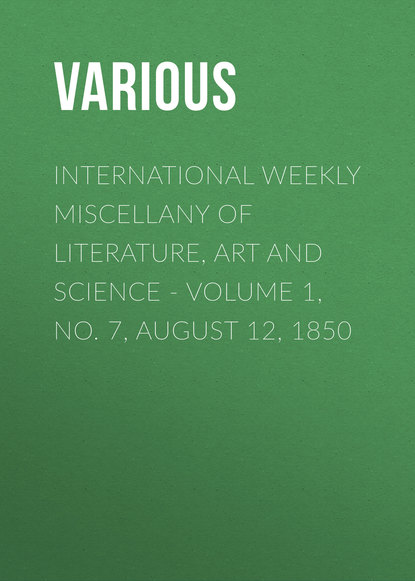 Полная версия
Полная версияInternational Weekly Miscellany of Literature, Art and Science - Volume 1, No. 7, August 12, 1850
The personal history of M. Rollin, since February 1848, is well-known and patent to all the world. He was the ame damnée of the Provisional Government—the man whose extreme opinions, intemperate circulars, and vehement patronage of persons professing the political creed of Robespierre—indisposed all moderate men to rally around the new system. It was in covering Ledru Rollin with the shield of his popularity that Lamartine lost his own, and that he ceased to be the political idol of a people of whom he must ever be regarded as one of the literary glories and illustrations. On the dissolution of the Provisional Government, Ledru Rollin constituted himself one of the leaders of the movement party. In ready powers of speech and in popularity no man stood higher; but he did not possess the power of restraining his followers or of holding them in hand, and the result was, that instead of being their leader he became their instrument. Fond of applause, ambitious of distinction, timid by nature, destitute of pluck, and of that rarer virtue moral courage, Ledru Rollin, to avoid the imputation of faint-heartedness, put himself in the foreground, but the measures of his followers being ill-taken, the plot in which he was mixed up egregiously failed, and he is now in consequence an exile in England.
GENERAL GARIBALDI
MR. FILIPANTE gives the following notice of this Italian revolutionary leader in a communication to the Evening Post. "His exertions in behalf of the liberal movement in Italy have been indefatigable. As active as he was courageous, he was among the first to take up arms against Austrian tyranny, and the last to lay them down. Even when the triumvirate at Rome had been overthrown, and the most ardent spirits despaired of the republic, Garibaldi and his noble band of soldiers refused to yield; they maintained a vigorous resistance to the last, and only quitted the ground when the cause was so far gone that their own success would have been of no general advantage.
"The General is about forty years of age. He was in early life an officer in the Sardinian service, but, engaging in an unsuccessful revolt against the government of Charles Albert, he was compelled to leave his native land. He fled to Montevideo, where he fought with distinction in the wars against Rosas. At the breaking out of the late revolution he returned. His military capacities being well known, he was entrusted with a command; and throughout the war his services were most efficient. He defeated the allied troops of Austria, France, and Naples, in several battles; his name, in fact, became a terror, and when the republic fell, and he was compelled to retire to the Appenines, the invaders felt that his return would be more formidable than any other event.
"From Italy he went to Morocco, where he has since lived. But his friends, desiring that his great energies should be actively employed, have offered him the command of a merchant ship, which he has accepted. He will, therefore, hereafter be engaged in the peaceful pursuits of commerce, unless his country should again require his exertions."
CRIME, IN ENGLAND AND FRANCE
In recent discussions of the effects of education upon morals, the relative conditions of Great Britain and France in this respect have often been referred to. The following paragraph shows that the statistics in the case have not been well understood:
"In a recent sitting of the Academy of Moral and Political Sciences, M. Leon Faucher, the representative, read a paper on the state of crime in England; and some of the journals have taken advantage of this to institute a comparison with returns of the criminality of France, recently published by the Government—the result being anything but flattering to England. But M. Faucher, the Academy, the newspapers, and almost everybody else in France, seems to be entirely ignorant that it is impossible to institute a comparison between the amount of crime in England and the amount of crime in France, inasmuch as crimes are not the same in both countries. Thus, for example, it is a felony in England to steal a pair of shoes, the offender is sent before the Court of Assize, and his offense counts in the official returns as a "crime;" in France, on the contrary, a petty theft is considered a délit, or simple offense, is punished by a police magistrate, and figures in the returns as an "offense." With respect to murders, too, the English have only two general names for killing—murder or manslaughter—but the French have nearly a dozen categories of killing, of which what the English call murder forms only one. It is the same, in short, with almost every species of crime."
1
RURAL HOURS: by a Lady, George P. Putnam, 155 Broadway. 1850.
2
In his early days the President of the Royal Academy painted a very striking portrait of Jane Porter, as "Miranda," and Harlowe painted her in the canoness dress of the order of St. Joachim.
3
In the press of Appleton & Co.
4
A Hunter's Life in South Africa. By R. Gordon Cumming, Esq., of Altyre.
5
In California horses are named according to their color. An alazan is a sorrel—a color generally preferred, as denoting speed and mettle.
6
The sarape is a knit blanket of many gay colors, worn over the shoulders by an opening in the center, through which the head is thrust.
7
Calzoneros are trowsers, generally made of blue cloth or velvet, richly embroidered, and worn over an under pair of white linen. They are slashed up the outside of each leg, for greater convenience in riding, and studded with rows of silver buttons.
8
The lariat, or riata, as it is indifferently called in California and Mexico, is precisely the same as the lasso of South America.



